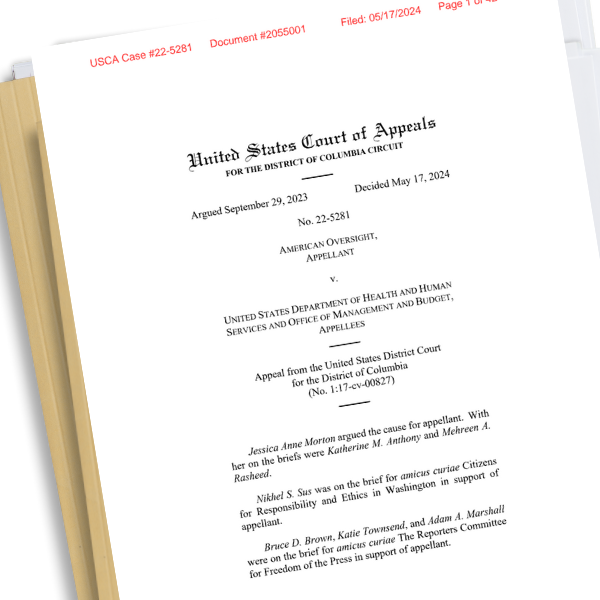
Seven Years Later, Congress Is Still Trying to Hide Communications About 2017 Efforts to Weaken ACA
In a case with major implications for the people’s right to government records, American Oversight has for years been fighting for the release of documents related to 2017 efforts to repeal or weaken the Affordable Care Act — and now Congress is also trying to help keep communications hidden.

Since 2017, American Oversight has been fighting in court for records from the Department of Health and Human Services (HHS) and the Office of Management and Budget (OMB) related to past efforts to weaken the Affordable Care Act. Now, more than seven years later, it’s Congress, not the federal agencies, that’s prolonging that fight.
Until a recent federal appeals court ruling, HHS and OMB had sought to withhold certain communications with Congress under an exemption typically used for agency employees, claiming that congressional staffers were acting as “consultants” in their communications with HHS and OMB employees. Now, despite HHS and OMB agreeing that the remaining records are public agency records subject to the Freedom of Information Act (FOIA), the House Committee on Ways and Means continues to contend that, based solely on the addition of an email template footer, some of the records are congressional, not the agencies’, and thus are not subject to FOIA.
In 2017, American Oversight requested and sued for communications about efforts to repeal or weaken the Affordable Care Act (ACA) between members of Congress and HHS and OMB staff members. At issue in the suit today are five email chains sent among members of the House Ways and Means Committee and HHS and OMB staff members in 2017. The committee, which intervened in the case in 2017, last month filed a motion for summary judgment requesting that the U.S. District Court for the District of Columbia block the release of the emails.
American Oversight filed its own cross-motion for summary judgment opposing Congress’ claims. The records were never understood by the agencies to be congressional records: Staff reviewed the records, used them in their analysis, and fully integrated them in their filing systems. Providing a congressional staffer with the power to block the release of records to the public simply based on the inclusion of a template email signature would be a major blow to transparency and presents grave implications for the separation of powers doctrine.
Through the litigation, we have obtained more than 3,200 pages of records, many of which were heavily redacted under FOIA’s Exemption 5, which shields the release of inter-agency or intra-agency memorandums. HHS and OMB also withheld or redacted several requested documents in full, including all substantive exchanges with Congress, citing the “consultant corollary” doctrine, a judge-created extension of Exemption 5 which applies when outside consultants are acting “akin to an agency employee.”
In May, the D.C. Circuit Court of Appeals ruled in favor of American Oversight, represented by Democracy Forward, making clear that government agencies cannot use the “consultant corollary” to evade public disclosure of records when the supposed consultants have their own interests — for example, political or electoral, as is potentially the case for members of Congress — in the outcome of agency decisions.
In response, the agencies reprocessed the documents and lifted certain redactions. Records released to American Oversight last month show that HHS and OMB staff members frequently communicated with certain congressional officials in early 2017 while ACA repeal efforts were underway, including then-Speaker of the House Paul Ryan and members of his office.
On March 6, 2017, the day that House Republicans announced their plan to replace the ACA with the American Health Care Act, Ryan’s then-policy director Austin Smythe asked then-OMB director Mick Mulvaney to produce an analysis contradicting information expected to be released by the Congressional Budget Office, the emails show.
“It will help us make the case for the bill if we got information from OMB/HHS to show the full effects of our bill combined with administrative action,” Smythe wrote to Mulvaney.
Mulvaney responded the same day, “Austin..help me. What are you specifically asking us to do?”
“After CBO puts out their cost estimate (likely a week from today), produce an analysis that states they’ve under-estimated coverage numbers and premium decreases because they haven’t taken into account administrative actions by HHS and you,” Smythe wrote back.
“Understood.. Thanks,” Mulvaney responded.
On March 9, 2017, Mulvaney asked Smythe if he could include OMB’s deputy associate director for health Tom Reilly in the conversation. In an email three days later, Smythe included Reilly along with Russ Vought and Joe Grogan, who were both OMB officials at the time and later contributed to Project 2025. Trump has nominated Vought to lead OMB during his upcoming administration.
Justice delayed is often justice denied, and the records at issue in this case — about decisions that could affect health coverage for millions of Americans — would have best served the public by being released at the time members of Congress were attempting to weaken the ACA. But seven years later, and with a new Trump administration set to take office, the public still deserves to see emails that could shed light on the political influences and negotiations behind efforts to upend the health-care law.


